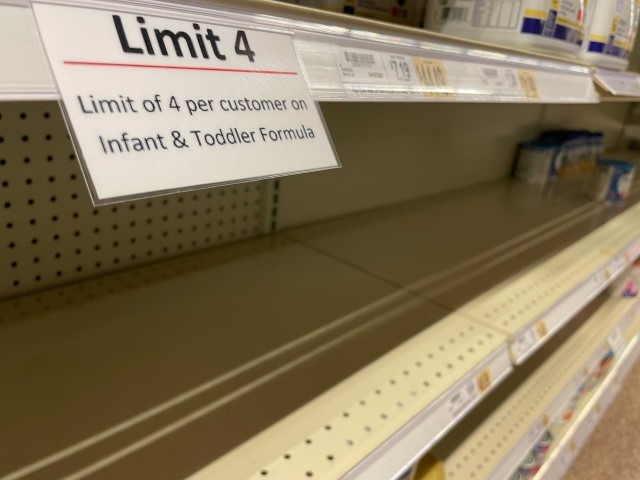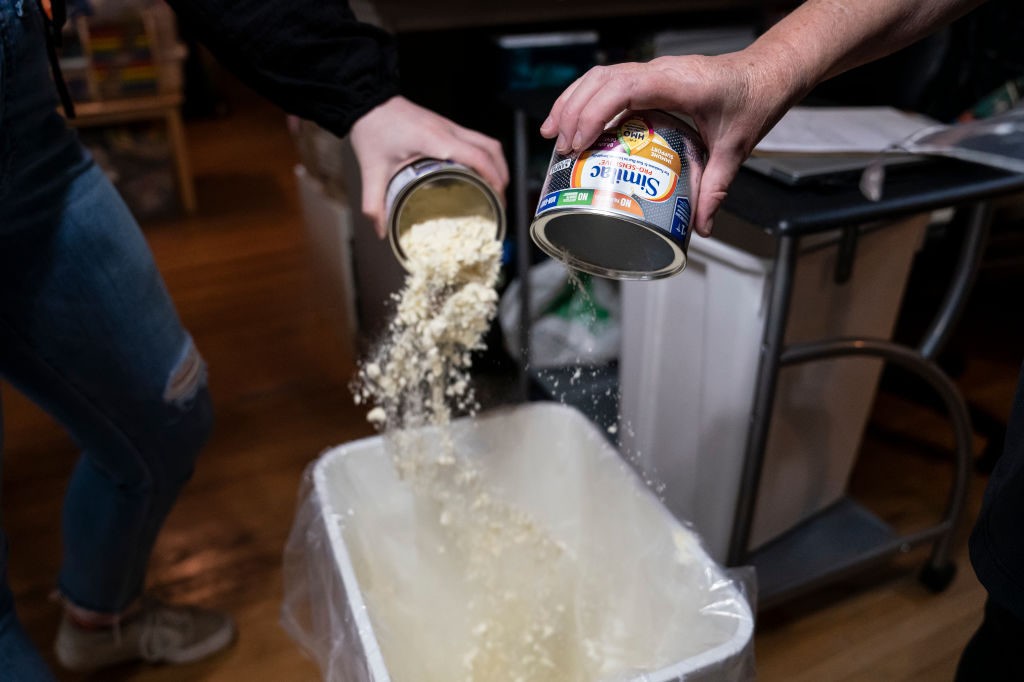The U.S. Food and Drug Administration (FDA) and pediatricians are urging parents not to feed babies homemade formula as the nationwide baby formula shortage worsens for helpless infants and their panicked parents.
Pediatrician are offering alternatives as a lack of leadership at the federal level has left parents without answers about how to feed their children.
Do Not Serve Babies Homemade Formula
The FDA advises parents and caregivers to not make or feed homemade infant formula to infants. Homemade infant formula recipes have not been evaluated by the FDA and may lack nutrients vital to an infant’s growth. It is important for parents and caregivers to remember that infant formula can be the sole source of nutrition for infants and is strictly regulated by the FDA.
Dieticians with the Goodhouse Keeping Institue Nutrition Lab spoke with two pediatricians regarding the harmful effects of homemade formulas and potential avenues parents can take for short-term solutions to the acute crisis, Good Housekeeping reported.
Pediatrician Tanya Altman, M.D., F.A.A.P, who founded Calabasas Pediatrics, told the outlet that formula “is a very complex nutrient-dense product made from years of development and clinical trials specifically for the needs of growing and developing babies.”
“Homemade infant formulas often do not have the correct ratio of important nutrients such as protein, fat, vitamins and minerals,” she added. Altman emphasized that nutrient deficiencies and electrolyte imbalances can arise from using homemade formulas, which in turn, could impede growth and bring about developmental issues.
Rep. @michaelgwaltz: Easier to Get a Crack Pipe than Baby Formula in Biden's America pic.twitter.com/zJQdyayBcp
— Breitbart News (@BreitbartNews) May 12, 2022
Stephanie Middleberg, M.S., R.D., founder of Middleburg Nutrition, highlighted that homemade formula could harbor contaminants.
“Homemade infant formula is not sterile and there are many possible sources of bacterial contamination, including unclean water and ingredients that can easily support bacterial growth and harm the infant,” she explained.
Diluting Formula Is Not a Safe Alternative
David Abrams, M.D., F.A.A.P., who formerly served as chair of the American Academy of Pediatrics’s National Committee on Nutrition, wrote in a Healthychildren.org article that diluting baby formula is not an alternative to the shortage and can result in severe health consequences for a baby:
No. While it may be tempting to water down formula to stretch it out, it is not safe to do that. Always follow label instructions or those given to you by your pediatrician. Watering down formula is dangerous. It can cause nutritional imbalances in your baby and lead to serious health problems. Always mix formula as directed by the manufacturer. [Emphasis Added]
Switching Baby Formula
Altman urged parents to consult with their pediatrician before switching formulas if their child is on a specialized formula due to allergy and sensitivity and has had adverse reactions to other formulas.
Middleberg told Good Housekeeping that any transition ideally would be to a formula with a similar protein source that the child is accustomed to, such as a goat milk protein or cow milk protein.

Empty shelves in the infant formula aisle in a Virginia store display a sign limiting the quantity each customer may buy–if they’re in stock. (Breitbart News)
She added that the switch should be gradual and slow, pointing out that a period of gassiness may arise, but it should normalize. Should things not improve or worsen, parents should immediately alert their pediatrician.
Abrams wrote:
For most babies, it is OK to switch to any available formula, including store brands, unless your baby is on a specific extensively hydrolyzed or amino acid-based formula such as Elecare (no store brand exists). Ask your pediatrician about recommended specialty formula alternatives available for your baby.
Reach Out
In his article, Abrams recommends contacting pediatricians, who may be able to procure the products from formula representatives or charities. He also says parents can reach out to their local Woman, Infants, and Children (WIC) program, which may have knowledge as to where formula can be purchased.
He advised parents and caregivers to look through social media that are dedicated to formulas and infant-feeding, noting that members of the page may know where to find the sparce products.
Abrams also recommended parents purchase formula online from domestic pharmacies and well-known distributors – if they can afford it – until the shortgae ceases.
Cow’s Milk and Toddler Formula
The Centers for Disease Control and Prevention (CDC) notes:
At 12 months old (but not before), your child can be introduced to cow’s milk. Before your child is 12 months old, cow’s milk may put him or her at risk for intestinal bleeding. It also has too many proteins and minerals for your baby’s kidneys to handle and does not have the right amount of nutrients your baby needs.
Abrams wrote that cow’s milk is certainly not ideal but says “in a pinch,” it is a superior alternative to making a homemade formula or diluting baby formula:
This may be an option if your child is older than 6 months of age and is usually on regular formula (not a specialty product for allergies or other special health needs). In a pinch, you could feed them whole cow’s milk for a brief period of time until the shortage is better. This is not ideal and should not become routine. However, it is a better option than diluting formula or making homemade formula. The most important concern with giving an infant over 6 months of age cow’s milk is making sure they get enough iron. Be sure to include plenty of iron-containing solid foods in their diet while you are using whole cow’s milk. You may also talk with your pediatrician about giving your baby an iron supplement.
He echoed the sentiment while speaking with CNN:
We discourage the use of cow’s milk until a year of age but it’s certainly true that as the baby is close to a year of age, especially if it’s simply no formula to be found, that you could use either that or a toddler formula. Neither are ideal, but the closer you are to the year, especially for the short term, those are alternatives.
He urges parents and caregivers not to use almond milk or plant-based milks as they do not have adequate proteins and minerals.

Staff at Mother & Child Education Center throw away recalled Similac baby formula, which the company would not replace or reimburse because the donated supplies did not come with a receipt, on May 12, 2022 in Portland, Oregon. More than 60 percent of Mother & Childs formula supply was affected by the recall. (Nathan Howard/Getty Images)
Altman emphasized the importance of giving babies infant specified formula for the first six months after birth but said some flexibility arises after that point in terms of using a toddler formula, according to CNN. She urged parents to speak to their children’s pediatricians before taking such action.
In his article, Abrams emphasized that toddler formulas are not recommended for infants but said if absolutely necessary, it can be given to babies close to a year old, but only for a couple of days.
Imported Formula
Altman told CNN that some products made in Australia and Europe are high quality but urged parents to seek reputable distributors.
“Not all international formulas are created equally, so you may want to make sure you know what you are getting and that it’s a high-quality product,” she said.
Abrams noted in his healthychildren.org article that he is apprehensive regarding imported baby formulas as they are not FDA approved.
“It’s a less-than-ideal alternative but if that’s what they have to do, then that’s what they have to do,” he told CNN.
An FDA spokesperson told CNN that the agency recommends against the alternative as products could be counterfeit.
COMMENTS
Please let us know if you're having issues with commenting.